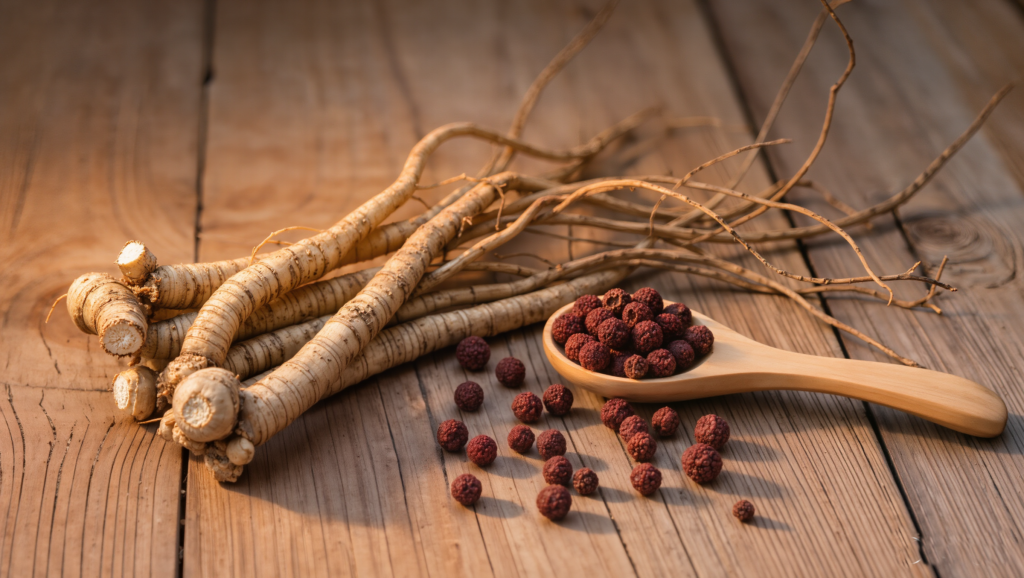ニア・ソムニフェラ)という名前が何度も出てくるのではないでしょうか。お茶からカプセルまで、あらゆる形で販売されているこの根は、ハーブ界の「ボトルに入った安らぎ」と称されることがよくあります。しかし、これは誇大広告でしょうか、それとも科学的根拠でしょうか?アシュワガンダのユニークな点と、不安な日々に安らぎをもたらす効果について、科学的根拠に基づいた分かりやすい解説で詳しく見ていきましょう。
アシュワガンダとは?
アシュワガンダはインドとアフリカの一部に自生する小さな低木ですが、真のスーパースターはその根です。アーユルヴェーダ医学において数千年にわたり使用されてきたアシュワガンダは、アダプトゲン(適応促進物質)として分類され、ストレスへの適応を助け、バランスを回復させる天然物質です。
アーユルヴェーダでは「牡馬の力」と呼ばれ、活力、体力、活力を与える力があることを示唆しています。
主な生理活性化合物は、ウィタノリド(ステロイド性ラクトンの独特なグループ)に加え、アルカロイドとフラボノイドです。
不安とストレスに対するアシュワガンダ:科学的根拠
臨床的エビデンスと結果
アシュワガンダの最も説得力のある根拠は、臨床研究によって安全かつ効果的であることが示唆されている方法で不安を軽減する能力です。
ランダム化試験のシステマティックレビューとメタアナリシスでは、アシュワガンダがプラセボと比較して、主観的なストレスと不安、そして血清コルチゾールなどの客観的な指標の両方を有意に低下させることが一貫して示されています。
2024年に558人の患者を対象としたメタアナリシスでは、アシュワガンダは検証済みのストレス・不安尺度のスコアを低下させ、同時にコルチゾール(ストレスホルモン)を確実に低下させました。
投与量は重要です。最も成功した試験では、標準化された根エキスとして1日250~700mgを30~90日間投与しました。日々。
最近行われたランダム化試験では、1日500mgのアシュワガンダ摂取により、幸福感、マルチタスク、睡眠が著しく改善されることが示されました。参加者は、アシュワガンダを摂取すると、ストレスが圧倒的ではなく、管理可能なレベルになったと報告しています。
他の複数の研究でも、このアダプトゲンを定期的に摂取することで、不眠症や疲労感が軽減され、集中力が向上し、生活の質(QOL)も向上したことが確認されています。
アシュワガンダが不安に効く理由とは? 科学的根拠
- ストレスホルモンの調節
アシュワガンダは、体の中枢ストレス反応システムである視床下部-下垂体-副腎(HPA)系を抑制することで作用します。 HPAの活性化が抑えられると、闘争・逃走反応が抑制され、ストレスへの反応が弱まります。
また、不安、不眠、気分の変動、炎症と密接に関連するコルチゾールの産生と血中濃度も低下させます。
- アダプトゲン特性
アシュワガンダはまさにアダプトゲンの典型です。身体が物理的、化学的、生物学的ストレスに抵抗するのを助け、慢性的なストレスによる長期的な消耗から身体を守ります。
カフェインや鎮静剤とは異なり、アダプトゲンはコルチゾールを(単に低下させるだけでなく)調節するため、急性ストレスや継続的なプレッシャーに直面しても、よりバランスの取れた状態を保つことができます。
- 神経伝達物質への直接的なサポート
いくつかの研究では、アシュワガンダが脳内のGABA受容体に作用することが示唆されています。GABAは、基本的に身体を落ち着かせる神経伝達物質です。 GABAの低下は、不安、落ち着きのなさ、睡眠不足につながります。
アシュワガンダはGABAシグナル伝達を強化することで、他の医薬品とは異なり、眠気や依存を引き起こすことなく、心の平穏をもたらします。
- 抗酸化作用と抗炎症作用
慢性的な不安やストレスは、脳内の炎症や酸化ストレスを悪化させる可能性があります。アシュワガンダに含まれるウィタノリド、アルカロイド、フラボノイドには、抗酸化作用と抗炎症作用があることが証明されており、心身を直接的に落ち着かせる可能性があります。
アシュワガンダ:有効成分:ウィタノリド以外にも
現代の研究室分析により、豊富な化学物質が特定されています。
ウィタノリド:抗不安作用と抗ストレス作用を持つステロイドラクトン。数十種類が確認されており、中でもウィタフェリンAが最も強力です。
アルカロイド:気分をさらにサポートするソムニフェリンやトロピンなど。
サポニンとフラボノイド: 抗炎症効果を高め、長期のストレスによる有害な副産物に対する体の抵抗力を助け、免疫システムをサポートし、睡眠と集中力をサポートします。
アシュワガンダは安全ですか?
臨床試験では、アシュワガンダは一般的に安全であると確認されており、軽度の副作用(例:少数の症例における胃の不調)が報告されているのみです。世界生物精神医学会連合などの主要団体は、現在、特定の用量でアシュワガンダを全般性不安障害の治療に暫定的に推奨しています。ただし、特に妊娠中、薬を服用中、または基礎疾患を抱えている場合は、新しいサプリメントを追加する前に必ず医師に相談してください。
誰にでも効果がありますか?(そして使用方法)
効果の現れ方は人それぞれです。遺伝、用量、さらには抽出物の配合(根、根と葉、ピペリン配合など)も影響するようです。
KSMとSensorilの根エキスは、最も研究が進んでいるエキスです。
不安やストレスに対する研究では、ほとんどの研究で標準化エキス(通常1.5%以上のウィタノリド)を1日250~500mg摂取しています。
アダプトゲンは累積的に作用することが多いため、完全な効果を得るには少なくとも4~8週間継続して摂取してください。
では、不安にアシュワガンダは試すべきでしょうか?
結論:アシュワガンダは、特に日常的なストレスや軽度の不安を抱えている人にとって、不安を軽減し、ストレスを和らげ、幸福感を高めるという確固たる証拠があります。深刻な症状における処方薬の代替となるものではありませんが、多くの人にとって、何世紀にもわたる伝統的な使用と蓄積された科学的記録に裏付けられた強力な植物療法となる可能性があります。
神経を自然にリセットする準備ができたら、高品質のアシュワガンダサプリメントを日常生活に取り入れ、彩り豊かで食物繊維が豊富な食事(腸内環境を整え、気分も良くします)を摂り、瞑想や運動などのグラウンディングプラクティスを試してみてください。適切なハーブを適切な状況で使用することで、本当に効果を発揮することがあります。difference.
この記事はいかがでしたか?Youtube, Instagram, Facebook, Pinterest, Twitter (X) でフォローして、ナチュラルヘルスと持続可能なウェルネスに関するその他のコンテンツをご覧ください。








